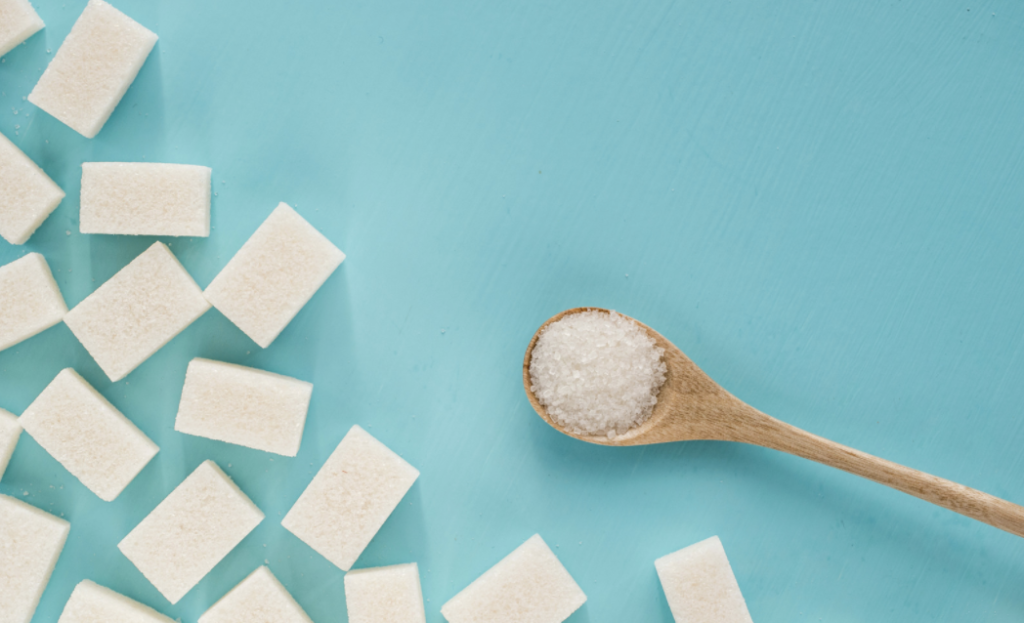
Written by Stefan Ianev (Clean Health Research & Development Specialist)
In recent years there has been a shift in the fitness industry from focusing mainly on insulin, macros, and nutrient timing to focusing mostly on protein and caloric intake. As long as you create an energy deficit and hit the minimal protein threshold, it doesn’t really matter how you get the remaining calories. It all comes down to personal preference.
There is more than a handful of fitness professionals and influencers that claim simple sugars such as glucose, sucrose, and high fructose corn syrup are not detrimental to your body composition or health as long as calories are controlled. While research does support the fact that excess energy intake is the primary driver of obesity and the associated health conditions, focusing solely on energy intake is like looking at the world through a straw.
In previous articles, I have discussed how macronutrient timing and composition can impact your physiology and affect things like hunger, energy, and performance, and recovery. In this article I want to share with you 5 reasons why consuming excess sugar may be detrimental to your health and goals.
The goal here is not to demonize sugar but to present you with an unbiased view of how sugar may be negatively affecting you.
- Sugar is Easy to Overeat
Recent studies have shown that if you control calories, sugar consumption does not lead to greater weight gain or have any adverse effects on blood lipids or insulin in comparison to wholefood, low GI, carbohydrate sources in people with normal insulin function (1-6).
Indeed, the devil is in the dose.
Excess caloric intake is much more strongly correlated with weight gain and inflammation than the type of foods consumed in the short term. However, considering how much easier it is to overconsume sugar, which is very energy dense and devoid of fibre, verses say sweet potato or other high fibre carbohydrates, you can see why we have a problem.
Sugar in its many forms is commonly found in many low fat treats disguised as healthy alternatives. However, the hidden calories can quickly stack up leading to weight gain just as rapidly as their high fat counterparts.

- Sugar Causes Cravings
Not only is sugar itself very easy to overeat (due to it being hidden in many common shelf items and the fact that it doesn’t fill you up), but it also makes you more prone to overeating other foods. This is because sugar enters the bloodstream very rapidly which spikes insulin levels, which leads to blood sugar levels crashing shortly after. This, in turn, makes you crave more sugar or other sweet foods.
This is especially true for people with insulin resistance who don’t receive the satiety signal from insulin. Studies show those with insulin resistance tend to eat 53-81% more following a high GI versus a low GI meal. (7,8).
It’s not just the extra calories from the sugar or high GI foods themselves that can make you gain weight but also the fact that they can cause you to overeat. Focusing on consuming high fibre, low density, low GI wholefood, will maintain more stable blood sugars and make you feel more satiated, which makes it easier to adhere to a caloric deficit.
- Sugar Adversely Affects Individuals with Insulin Resistance
Excess sugar consumption by itself does not directly cause insulin resistance, at least not in the short term, but rather indirectly due to the accumulation of excess body fat (9,10). This is because fat cells release inflammatory cytokines and insulin resistance is strongly linked to inflammation, which leads to impaired insulin signalling. Therefore, the fatter someone is the more inflamed and insulin-resistant they tend to be.
Once the damage to the insulin receptors has been done however, it becomes much more important to manage insulin levels as well as energy intake through diet. This means reducing carbohydrates and especially sugar. Studies have shown people with insulin resistance respond more adversely to a high glycaemic diet both in terms of body composition and appetite control (1,7,8,11,12). That’s because once insulin levels are chronically elevated it becomes much harder to mobilize fat.
For those with normal insulin function, it’s probably more important to focus on controlling caloric intake in order to prevent gaining body fat in the first place. However, as we’ve already seen, a high sugar intake makes it harder to control caloric intake.
- Sugar Increases Inflammation
Outside of body composition, excess sugar intake can affect other health markers such as inflammation, both directly and indirectly. Inflammation has been linked to many health conditions such as diabetes, Alzheimer’s, rheumatoid arthritis, and atherosclerosis (13).
Indirectly, sugar consumption can increase body fat by way of excess energy intake, which we’ve already discussed increases inflammation (9,10). Studies have shown that sugar consumption can also directly increase inflammation, independent of caloric intake.
Several studies have shown increased inflammatory markers such as C-reactive protein and uric acid from the consumption of a single can of soda per day (14,15). Other studies have shown that eating refined carbohydrates also increases inflammation (16,17). The inflammatory response is thought to be mediated by alterations of gut microbiota (17).
This suggests that even though a high glycaemic diet may not impact body composition in the short term if calories are controlled, the increased inflammation over time may lead to other health conditions. In fact, several observational studies have linked inflammatory conditions such as rheumatoid arthritis, diabetes, and cardiovascular disease to increased sugar and refined carbohydrate intake, independent of other dietary and lifestyle factors (18-22).
- Sugar Accelerates Aging
We’ve already discussed how sugar can increase inflammation both directly and indirectly. Chronic inflammation has been associated with premature aging and represents a significant risk factor for morbidity and mortality (23).
Additionally, the effects of sugar on skin aging have been well documented. Glucose and fructose link the amino acids present in the collagen and elastin that support the dermis, producing advanced glycation end products or “AGEs.” This process is accelerated in all body tissues when sugar is elevated (24). Increased accumulation of AGEs in human tissue has also been associated with end-stage renal disease, chronic obstructive pulmonary disease, and diabetic complications (25).
Tight glycaemic control over a 4-month period has been shown to result in a reduction of glycated collagen formation by 25% (24,26). A diet low in AGEs also correlated with a reduction in inflammatory biomarkers (i.e. tumour necrosis factor-alpha, interleukin-6, and C-reactive protein) in diabetic patients (27).
As you can see outside of controlling calories to improve body composition, there may be benefits to limiting sugar intake to promote healthy aging.

If you would like to learn more about our coaching tools and strategies for you to optimize not only your clients’ physique, but their mental fitness, overall wellness and quality of life, click here to enrol into the Performance Nutrition Coach Certification Collection & SAVE with our New Year’s Eve Sale!
References:
- Pittas AG, Das SK, Hajduk CL, Golden J, Saltzman E, Stark PC, Greenberg AS, Roberts SB. A low-glycemic load diet facilitates greater weight loss in overweight adults with high insulin secretion but not in overweight adults with low insulin secretion in the CALERIE Trial.Diabetes Care. 2005 Dec;28(12):2939-41.
- West, JA, De Looy AE. Weight loss in overweight subjects following low-sucrose or sucrose-containing diets. International Journal of Obesity & Related Metabolic Disorders,2001 Aug;25(8):1122-8.
- Saris WH, Astrup A, Prentice AM, Zunft HJ, Formiguera X, Verboeket-van de Venne WP,Raben A, Poppitt SD, Seppelt B, Johnston S, Vasilaras TH, Keogh GF. Randomized controlled trial of changes in dietary carbohydrate/fat ratio and simple vs complex carbohydrates on body weight and blood lipids: the CARMEN study. International Journal of Obesity & Related Metabolic Disorders. 2000 Oct;24(10):1310-8.
- Raatz SK, Torkelson CJ, Redmon, JB, Reck KP, Kwong CA, Swanson JE, Bantle JP. Reduced glycemic index and glycemic load diets do not increase the effects of energy restriction on weight loss and insulin sensitivity in obese men and women. The Journal of Nutrition,2005 Oct;135(10):2387-91.
- Surwit RS, Feinglos MN, McCaskill CC, Clay SL, Babyak MA, Brownlow BS, Lin PH. Metabolic and behavioral effects of a high-sucrose diet during weight loss. The American Journal of Clinical Nutrition 65.4 (1997): 908-915.
- Aller EE, Larsen TM, Claus H, Lindroos AK, Kafatos A, Pfeiffer A, Saris WHM. (2014). Weight loss maintenance in overweight subjects on ad libitum diets with high or low protein content and glycemic index: the DIOGENES trial 12-month results. International Journal of Obesity, 2014 Dec;38(12):1511-7.
- Ludwig DS, Majzoub JA, Al-Zahrani A, Dallal GE, Blanco I, Roberts SB. High glycemic index foods, overeating, and obesity. Pediatrics 1999;103(3), e26-e26.
- McClain A, et al. Adherence to a low‐fat vs. low‐carbohydrate diet differs by insulin resistance status. Diabetes, Obesity and Metabolism 2013;15(1), 87-90.
- Ronti T, Lupattelli G, Mannarino E. The endocrine function of adipose tissue: an update.Clinical Endocrinology. 2006;64(4):355–365.
- Macdonald IA. A review of recent evidence relating to sugars, insulin resistance and diabetes. Eur J Nutr. 2016;55(Suppl 2):17–23. doi:10.1007/s00394-016-1340-8
- Cornier MA, et al. Insulin sensitivity determines the effectiveness of dietary macronutrient composition on weight loss in obese women. Obesity Research. 2005;13(4):703–709.
- Flint A, et al. Associations between postprandial insulin and blood glucose responses, appetite sensations and energy intake in normal weight and overweight individuals: a meta-analysis of test meal studies. British Journal of Nutrition. 2007 Jul;98(1):17-25.
- Harvard Health Letter. “Inflammation: A unifying theory of disease.” Harvard Health Publishing, Harvard Medical School, Apr 2006.
- Raben A, et al. Low to moderate sugar-sweetened beverage consumption impairs glucose and lipid metabolism and promotes inflammation in healthy young men: a randomized controlled trial. Ugeskr Laeger. 2002 Jan 28;164(5):627-31.
- Consumption of sucrose-sweetened soft drinks increases plasma levels of uric acid in overweight and obese subjects: a 6-month randomised controlled trial. Eur J Clin Nutr.2015 Aug;69(8):949-53. doi: 10.1038/ejcn.2015.95. Epub 2015 Jun 17.
- Scott Dickinson, Dale P Hancock, Peter Petocz, Antonio Ceriello, Jennie Brand-Miller, High–glycemic index carbohydrate increases nuclear factor-κB activation in mononuclear cells of young, lean healthy subjects, The American Journal of Clinical Nutrition, Volume 87, Issue 5, May 2008, Pages 1188–1193,
- Spreadbury I. Comparison with ancestral diets suggests dense acellular carbohydrates promote an inflammatory microbiota, and may be the primary dietary cause of leptin resistance and obesity. Diabetes Metab Syndr Obes. ;5:175–189. doi:10.2147/DMSO.S33473
- Hu Y, Costenbader KH, Gao X, et al. Sugar-sweetened soda consumption and risk of developing rheumatoid arthritis in women. Am J Clin Nutr. 2014;100(3):959–967. doi:10.3945/ajcn.114.086918
- Anette E Buyken, Victoria Flood, Marianne Empson, Elena Rochtchina, Alan W Barclay, Jennie Brand-Miller, Paul Mitchell, Carbohydrate nutrition and inflammatory disease mortality in older adults, The American Journal of Clinical Nutrition, Volume 92, Issue 3, September 2010, Pages 634–643
- Yang Q, Zhang Z, Gregg EW, Flanders WD, Merritt R, Hu FB. Added Sugar Intake and Cardiovascular Diseases Mortality Among US Adults. JAMA Intern Med. 2014;174(4):516–524. doi:10.1001/jamainternmed.2013.13563
- Malik VS. Sugar sweetened beverages and cardiometabolic health. Curr Opin Cardiol. 2017 Sep;32(5):572-579. doi: 10.1097/HCO.0000000000000439.
- Tappy L, Morio B, Azzout-Marniche D, et al. French Recommendations for Sugar Intake in Adults: A Novel Approach Chosen by ANSES. Nutrients. 2018;10(8):989. Published 2018 Jul 29. doi:10.3390/nu10080989
- Sanada F, Taniyama Y, Muratsu J, et al. Source of Chronic Inflammation in Aging. Front Cardiovasc Med. 2018;5:12. Published 2018 Feb 22. doi:10.3389/fcvm.2018.00012
- Danby FW. Nutrition and aging skin: sugar and glycation.Clin Dermatol. 2010 Jul-Aug;28(4):409-11. doi: 10.1016/j.clindermatol.2010.03.018.
- Nguyen HP, Katta R. Sugar Sag: Glycation and the Role of Diet in Aging Skin. Skin Therapy Lett. 2015 Nov;20(6):1-5.
- Draelos ZD. Aging skin: the role of diet: facts and controversies. Clin Dermatol. 2013 Nov-Dec;31(6):701-6.
- Vlassara H, Striker GE. AGE restriction in diabetes mellitus: a paradigm shift. Nat Rev Endocrinol. 2011 Sep;7(9):526-39.






